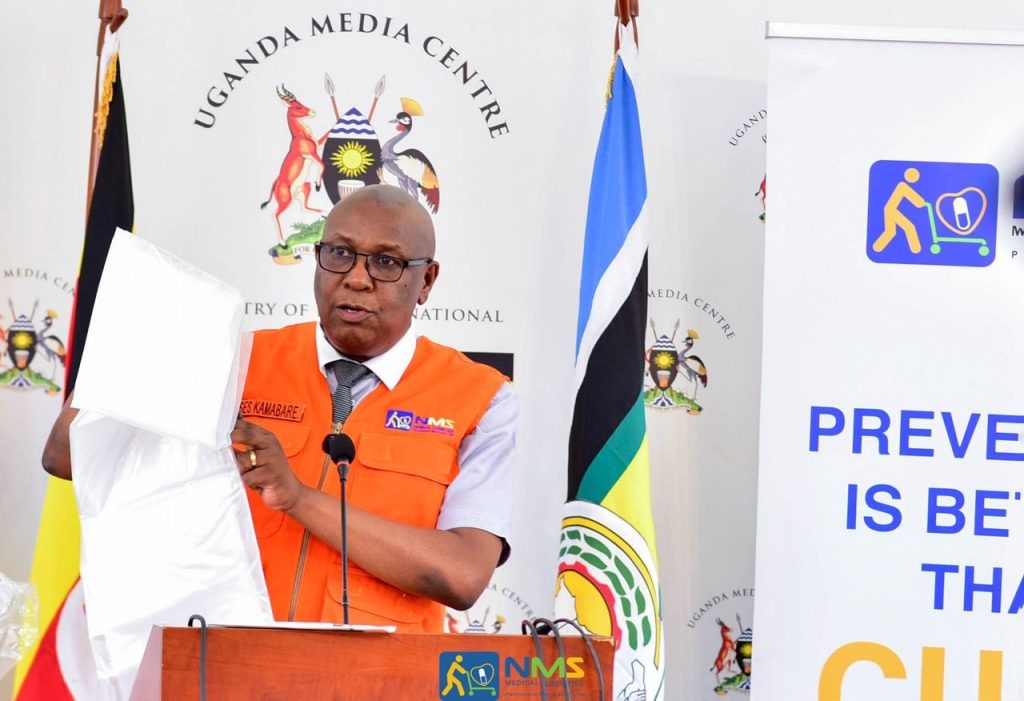By: Boy Fidel Leon
National Medical Stores isn’t playing around any more. At a multi-agency launch on Sunday, NMS General Manager Moses Kamabare laid out a simple proposal for Parliament. Makes stealing government medicine so expensive that nobody dares try it.
“Currently, when someone steals medicines worth 200 million shillings, they can walk away with a fine of about 5 million,” Kamabare said. “That is far too lenient.”
His solution? Triple penalties. Steal drugs worth 1 billion shillings, pay 3 billion. Maths is designed to hurt.
The month-long media campaign launching across radio and online platforms comes with a blunt message: these aren’t just government assets with price tags. When medicines disappear, people die.
“No Ugandan should die because the drugs meant to save them were taken away,” Kamabare said, framing drug theft not as corruption but as something closer to murder.
NMS is backing up the tough talk with transparency measures already in place. Every delivery truck has GPS tracking. Dispatch and delivery alerts go out to stakeholders who can verify shipments in real time. Signed delivery notes accompany each consignment.
“Any citizen or official can verify that medicines reached their facility in good order,” Kamabare explained.
And he reminded everyone of the basic rule many Ugandans already know gets broken constantly: government medicine is free. “If anyone asks you to pay, that is theft. Report it immediately.”
Uganda Police spokesperson ACP Rusoke Kituuma promised whistleblower protection and no mercy for thieves.
“The moment you blow the whistle, we are ready to protect you,” Kituuma said. “Anyone who dares steal our medicines will be treated as a threat to national security and dealt with firmly.”
It’s strong language that reflects how drug pilferage has become a national embarrassment. Stealing from sick people ranks amongst the lowest crimes imaginable, yet it happens regularly enough to warrant this kind of coordinated response.
Dr. Warren Namara, head of the Health Monitoring Unit, put scale to the problem. In just two years, HMU recovered medicines and equipment worth over 1.5 billion shillings. Many cases are grinding through court while patients suffered or died waiting for drugs that never arrived.
“The health of the population is a strategic resource. You destroy it at your own peril,” Namara warned.
He urged anyone noticing suspicious activity to call the hotline: 0800200447. The appeal to the media was equally direct, pursuing investigative reporting that exposes culprits, not just sensational headlines.

Dr. Charles Olaro, Director General of Health Services, previewed the upcoming National Drug and Health Products Authority Bill as a “game-changer” with strict penalties specifically targeting those entrusted with government medicine.
But he also pushed prevention from another angle: healthier living means less demand for drugs in the first place. Safer roads, reduced alcohol intake, no smoking, good nutrition, exercise, all reduce the burden on a system already struggling with theft.
Hospitals are tightening accountability too. Better stock cards, proper dispensing logs, functional Medicines and Therapeutics Committees. Procurement plans aligned to actual patient needs to cut down on expired drugs and waste.
Grand launches and stern warnings are easy. Uganda has seen plenty of anti-corruption campaigns that fizzled once cameras left. What matters is whether these agencies actually prosecute cases, whether courts hand down meaningful sentences, whether Parliament passes those triple-penalty laws.
Drug theft thrives in the gap between policy and practice. Everyone knows it happens. Health workers sometimes supplement meagre salaries by selling government medicine. Middlemen know which facilities to target. Patients expect to pay even when treatment should be free.
Breaking that cycle requires more than a media campaign. It needs arrests, convictions, and punishment harsh enough that the risk finally outweighs the reward.
If Kamabare’s 3-to-1 penalty proposal becomes law and actually gets enforced, it could finally make medicine theft too expensive to attempt.
Until then, this remains another promise in a country that’s heard many. While this continues to happen, many lives are hanging in the balance while reforms inch forward and thieves calculate their odds.


